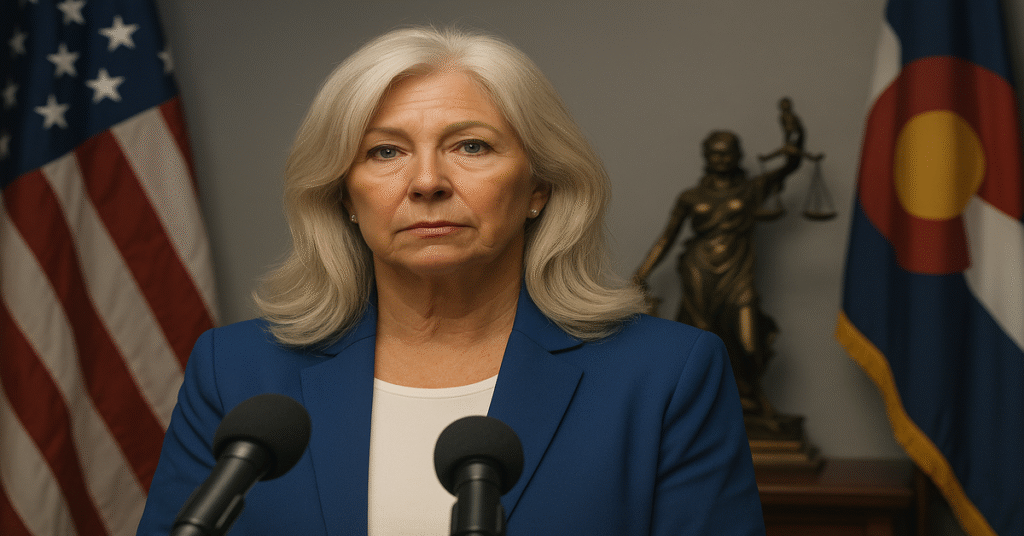Tina Peters emerged as a national figure in the United States amidst rising concerns about election integrity and security. Originally known as a public servant in Colorado, she later became a central subject of political, legal, and ideological debate. Her involvement in election-related controversies and legal battles has made her a focal point for discussions on the intersection of politics, cybersecurity, and public trust in democratic institutions.
Background and Early Career
Early Life and Career Path
Tina Peters did not start her career in the political spotlight. Like many public officials, she built her professional life in the private sector before transitioning into government service. With a background in business and entrepreneurial ventures, she brought a corporate-minded approach to her role in public office. Peters entered the political scene with a reputation for community engagement and business acumen.
Entry into Public Office
Her rise to public office came with her election as Mesa County Clerk and Recorder in Colorado. As clerk, she was responsible for overseeing elections, maintaining public records, and managing DMV-related functions. Initially, her time in office was largely unremarkable, focused on typical administrative duties, voter registration management, and election logistics.
Responsibilities as a County Clerk
Election Oversight
As County Clerk, one of Peters’ primary responsibilities was overseeing elections. This included ensuring the accuracy and security of voting systems, verifying voter registrations, and supervising ballot counting and certification.
Record Keeping and Public Services
In addition to election-related duties, her office also handled various public records including marriage licenses, real estate documents, and vehicle registration. These roles required high levels of accuracy, integrity, and adherence to state laws.
Controversy and Public Attention
The 2020 Election and Its Aftermath
The 2020 U.S. presidential election brought unprecedented scrutiny to election officials across the country. Allegations of widespread voter fraud, mostly unsubstantiated, were circulated by certain political groups and individuals. In this charged environment, Tina Peters began questioning the integrity of voting machines and processes used in Mesa County.
Involvement in Election Data Leak
The controversy surrounding Peters intensified when she was accused of facilitating unauthorized access to secure election systems. This included allegations that sensitive information from Mesa County’s Dominion Voting Systems equipment was copied and leaked. The leak was eventually shared publicly and cited in unfounded claims about election fraud.
Reaction from Authorities
The response from state and federal authorities was swift. Colorado’s Secretary of State launched an investigation, and Peters faced mounting legal scrutiny. She was accused of violating state election security protocols, and her access to election systems was revoked pending further investigation.
Legal Proceedings and Charges
Criminal Indictments
In 2022, a grand jury indicted Tina Peters on several criminal charges. These included tampering with election equipment, conspiracy to commit criminal acts, and misconduct in office. The indictments were part of a broader investigation into her actions during and after the 2020 election.
Defense and Legal Arguments
Peters and her legal team claimed that her actions were aimed at ensuring transparency and restoring public confidence in elections. They argued that the public had a right to scrutinize election systems and that her motivations were rooted in accountability, not misconduct.
Court Appearances and Developments
Her court appearances garnered national attention, particularly among those on both sides of the political aisle. Supporters saw her as a whistleblower, while critics viewed her as a threat to the sanctity of democratic processes. The legal proceedings are ongoing, and outcomes may shape future interpretations of election law.
Political Affiliations and Advocacy
Alignment with Election Integrity Movements
Since the controversy, Tina Peters has aligned herself with national movements focused on what they call “election integrity.” These groups argue that electoral systems are vulnerable to fraud and manipulation, despite evidence to the contrary from bipartisan election audits.
Public Speaking and Media Appearances
Peters has participated in numerous media interviews, podcasts, and events, often appearing at conferences or forums with speakers promoting similar views on election security. Her presence at such events has both elevated her profile and deepened the controversy surrounding her actions.
Political Candidacy
Despite ongoing legal issues, Peters announced her candidacy for statewide office, seeking to become Colorado Secretary of State. Her campaign centered on themes of transparency, government accountability, and citizen oversight of elections. However, her legal entanglements proved a significant obstacle, and she ultimately did not succeed in her electoral bid.
Impact on Public Trust and Democracy
Polarization and Public Opinion
Tina Peters has become a polarizing figure in American politics. To some, she represents a courageous whistleblower willing to stand against a potentially flawed system. To others, she epitomizes the dangers of spreading misinformation and undermining democratic institutions.
Election Security Reforms
The controversy has led to broader conversations and even policy proposals aimed at strengthening election security. These include improvements to access controls, chain-of-custody protocols for voting equipment, and staff training on cybersecurity threats.
Legal Precedents and Future Ramifications
The legal proceedings against Peters could set important precedents. Questions about how far election officials can go in “investigating” their own systems may influence how future claims of electoral irregularities are handled.
Ethical Considerations
The Whistleblower Debate
Was Tina Peters acting as a whistleblower or engaging in unlawful behavior? This debate lies at the heart of her case. Whistleblower protections exist for government employees who expose wrongdoing, but they also come with strict criteria and limitations. Critics argue that Peters failed to follow established channels for raising concerns, while supporters believe her actions were necessary and justified.
Balancing Transparency and Security
Another key ethical dilemma involves the tension between transparency and security. Election officials are expected to provide transparency to ensure public trust, but they must also protect sensitive systems from interference. Peters’ case illustrates how difficult it can be to strike that balance, especially when political pressure mounts.
The Role of Media
Coverage by Traditional Media
Mainstream media coverage of Peters has generally focused on the legal and procedural aspects of her case. News outlets have reported extensively on her indictments, court appearances, and the broader implications for election integrity.
Influence of Alternative Media
In contrast, alternative media platforms have often portrayed Peters more sympathetically. Interviews and documentaries have highlighted her perspective and framed her as a courageous truth-seeker. This disparity in coverage reflects broader trends in media polarization and audience segmentation.
Public Reactions and Protests
Support from Political Activists
Tina Peters has garnered a significant base of support, especially from conservative activists concerned about election fraud. Protests, rallies, and fundraising efforts have been organized in her name, painting her as a symbol of resistance against perceived government overreach.
Backlash from Civil Rights Groups
On the other hand, civil rights and election protection groups have criticized her actions, emphasizing the dangers of undermining election confidence without concrete evidence. They argue that such behavior can lead to voter suppression, intimidation, and diminished turnout.
Government and Institutional Response
Secretary of State’s Office
Colorado’s Secretary of State has taken a firm stance on the issue, implementing new rules and protocols to prevent similar breaches in the future. These include restricted access to election equipment and enhanced monitoring of county election offices.
Legislative Proposals
Lawmakers in Colorado and beyond have proposed bills aimed at clarifying the roles and limitations of local election officials. Some proposals advocate for stricter penalties for unauthorized access, while others call for more transparency in election software.
Lessons from the Tina Peters Case
Importance of Adhering to Protocol
One of the clearest lessons from this situation is the importance of following legal and ethical procedures. Even well-intentioned individuals can cause significant harm when they bypass safeguards designed to protect democratic systems.
The Fragility of Public Trust
Public trust in elections is foundational to democracy. Cases like Tina Peters’ show how quickly that trust can be eroded—and how hard it is to rebuild. Transparency, education, and consistent enforcement of laws are essential in maintaining that trust.
The Role of Local Officials
Local election officials are the front lines of democracy. They wield significant power and responsibility, and their actions can influence both local and national perceptions of legitimacy. Ensuring that they are properly trained, supported, and held accountable is crucial.
Conclusion
Tina Peters’ journey from a relatively unknown county clerk to a controversial national figure encapsulates many of the tensions facing American democracy today. Her actions have provoked legal scrutiny, polarized communities, and triggered debates about election integrity, whistleblower protections, and the responsibilities of public officials. Whether viewed as a hero or a cautionary tale, Peters’ story serves as a powerful reminder of the fragile balance between transparency, accountability, and the rule of law in democratic governance.
FAQs
1. Who is Tina Peters?
Tina Peters is a former Mesa County Clerk and Recorder in Colorado who became known for her controversial actions surrounding the 2020 election.
2. What was she accused of doing?
She was accused of facilitating unauthorized access to election equipment and leaking sensitive information related to voting systems.
3. Is Tina Peters facing legal charges?
Yes, she has been indicted on multiple criminal charges including tampering with election equipment and misconduct in public office.
4. Did Tina Peters run for public office again?
Yes, she ran for Colorado Secretary of State but did not win the election, largely due to her ongoing legal challenges.
5. What is her stance on election integrity?
Peters claims she acted to expose vulnerabilities in election systems and restore public confidence in the voting process.
6. Why is her case significant?
Her case raises important questions about election security, public trust, the limits of whistleblower protections, and the legal responsibilities of election officials.







